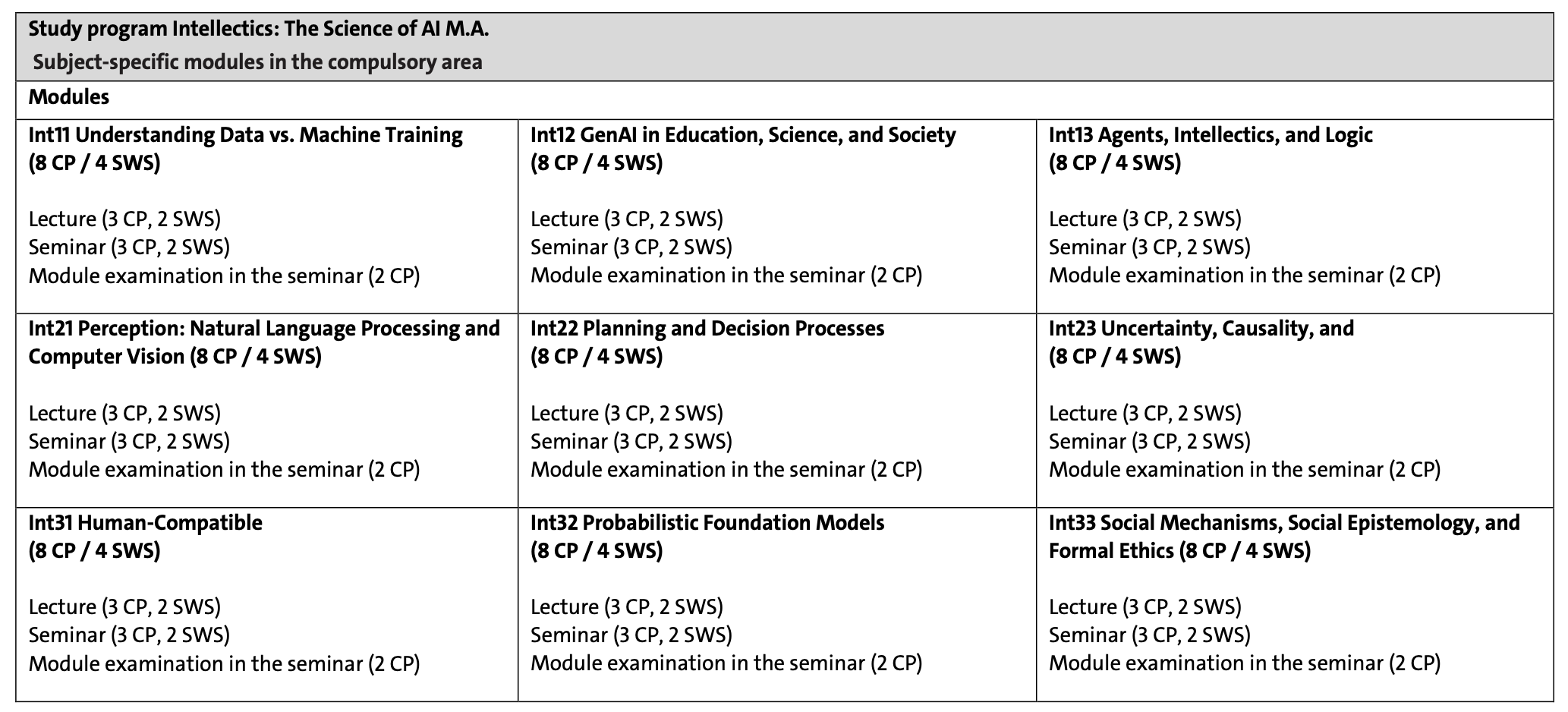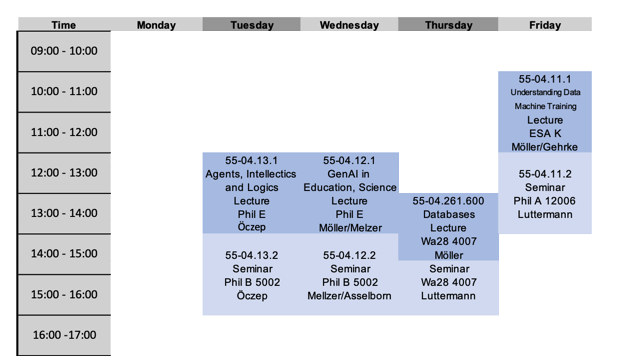Intellectics: The Science of AI
Note: Please register in the Moodle system to access lecture slides etc.
Aim
The aim of the research-oriented and fully English-language degree program
“Intellectics: The Science of AI M.A.” is to provide students with a deep understanding of the fundamentals, approaches, methods and results in the science of artificial intelligence (AI) on the basis of the humanistic educational principle, as well as to promote a broad scientific understanding of the interaction of humans with systems that can perform non-trivial tasks for humans from different perspectives. Approaches are pursued that arise, for example, from relevant issues in the humanities and philosophy in particular.
More Detailed Information
More detailed information on credit points (PDF)
More detailed official description of the curriculum (PDF) (German, legally binding)
More detailed description of the curriculum (PDF) (English, not legally binding, translated from German version with Google Translate)
Intellectics as a Science
Historically, the science of AI has seen itself as an interdisciplinary field of research that uses approaches and findings from various humanities and structural sciences (in addition to engineering and natural sciences) and implements and further develops them from an information technology perspective. Recent developments in the use and evaluation of large language models used in chatbots, such as ChatGPT, have made the (need for) interdisciplinarity even more apparent than before. Chatbots such as ChatGPT have a natural language interface through which instructions are given to the chatbot and dialogs take place between humans and the chatbot.
Even if the large language models used by the chatbots were generated using optimization methods, linguistic models of natural language and logics for representing the state of the dialogue, for example, are absolutely necessary in order to evaluate and understand the course of the dialogue and the explanations and arguments used in it. The extent to which a text-generating chatbot can (not) understand or know something can be discussed using approaches from the philosophy of mind and epistemology. To give another example: The extent to which a chatbot can be held responsible for negative events resulting from a dialog, for example, can be effectively discussed by students using approaches from ethics, psychology and causality research, among others, provided that students have acquired the intended subject-specific formal foundations of model building during their studies. This creates the necessary prerequisites for responsible action in later professional life.
Artificial Intelligence
The critical-analytical examination in the humanities is supplemented in this degree program by informatic abstraction and model building, in particular the creation, implementation and evaluation of models. In this way, students not only learn to critically reflect on purely analytical explanations, but are also enabled to analyze, apply and modify an applicable model of causality that can be implemented using information technology and, if necessary, to use it as a blueprint for developing their own models. Central to the teaching of information technology abstraction and modeling is the paradigm of a rational agent, i.e. an actor acting in a dynamic environment who, with limited time and memory resources, independently develops a plan to achieve an internal goal based on his observations and his internally formed model. The internal goal is developed by the agent from a context description and a task description, which can originate from a human or another agent. The fulfillment of the tasks assigned to the agents through rational action, taking into account the available resource constraints (memory space, computing time), defines the concept of intelligence used in intellect as a science: In this sense, agents can act intelligently by fulfilling the non-trivial tasks assigned to them to the satisfaction of the participating humans (as task setters), without an algorithm having been directly specified or learned from data.
In a system consisting of (several) agents and humans, the interaction of humans and agents in a so-called (social) mechanism poses additional challenges due to the fact that several actors with possibly different local goals act in an environment, whereby the respective local goals may be incompatible with each other or with a global goal. If a global goal is reliably achieved by such a system, it is commonly referred to as an intelligent system or AI system for short. In an intelligent system, it must be ensured that task descriptions are implemented by the agents in the interests of all people involved in the mechanism (AI alignment) so that ethical principles are observed. The latter aspects in particular are the subject of current AI research into the formal systems with risk assessments and safety guarantees required for this. The Intellectics: The Science of AI M.A. program systematically addresses these aspects, among others, in the modules.
Summary
In summary, in addition to a critical-analytical examination of intelligent agents, students also acquire the necessary theoretical and practical skills to develop new safe, trustworthy, robust, transparent and explainable agents themselves and to learn to evaluate a wide range of possibilities and potential dangers by reflecting on social mechanisms and ethical issues. This core competence is covered in the degree program by three pillars (see below), whereby the first pillar covers general data and algorithmic competence, the second pillar covers modeling competence (especially for planning) in an agent and the third pillar covers modeling for the design of multi-agent systems and social mechanisms.
Career prospects
Professionally, this not only opens up the option for students to pursue an academic career with a doctorate in the interdisciplinary field of AI, e.g. with computer science, philosophy, mathematics, sociology, economics, etc., but also the option of working in an advisory capacity in companies, commissions or non-profit organizations for all AI-relevant topics, for example. The declared aim of the degree program in terms of sustainable teaching is not only to help students to successfully apply for jobs in the aforementioned areas, but also to ensure quality and stability in professional life (job security) by teaching the essential ideas, concepts, methods and approaches - in contrast to currently fashionable technologies, programming languages or similar.
Acknowledgements
The Intellectics: The Science of AI M.A. program takes up an early proposal by Wolfgang Bibel for a sustainable scientific field of “Intellectics” (to distinguish it from the still common understanding of AI as a set of tools and methods for IT applications). However, his original focus on cognitive science theories and methods for the design of an individual agent is significantly expanded in the course to include approaches from game theory, questions of the design of (social) mechanisms and principles of formal ethics. Only with the global perspective of these approaches can safe, trustworthy, robust, transparent and explainable multi-agent systems and social mechanisms be developed in which socially relevant values, norms and goals are appropriately taken into account.



